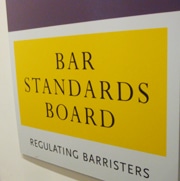
BSB: stealing is incompatible with membership of the bar
An unregistered barrister has been fined £1,000 by a Bar disciplinary tribunal for falsely describing himself as a solicitor and appearing in court when he did not have the right to do so.
Stephen Robertson Aseka was found to have carried out a reserved legal activity in June 2015 – exercising rights of audience in a fast-track case in the county court – without holding a practising certificate.
The tribunal said Mr Aseka “recklessly permitted the court to be misled as to his professional status [by] failing to correct the court’s impression that he was a solicitor when he was not and had no appropriate legal qualification entitling him to appear before the court on behalf of his client”.
He was also found to have failed to act “with honesty or integrity” in that he “falsely described himself as a solicitor for the defendant” when approving a draft order.
The Bar Standards Board (BSB) said Mr Aseka was an unregistered barrister, called in October 2011. He was fined £1,000, a sanction which is currently open to appeal.
In a further case involving an unregistered barrister, Mahnoor Choudhury was disbarred by a tribunal last week for stealing money from her employer’s petty cash and from her work colleagues’ bags.
Ms Choudhury, who was working as a paralegal for Surrey law firm Howells Jones Solicitors, was also reprimanded by the tribunal for not reporting her “serious misconduct” promptly to the BSB.
In a statement, the BSB said Ms Choudhury, was “summarily dismissed by her employer on 22 June 2016” for stealing a total of around £400.
A BSB spokeswoman added: “Acting dishonestly by stealing money is incompatible with membership of the Bar.”
Ms Choudhury was called in 2014. Her sanction is open to appeal.
She was banned from working for law firms by the Solicitors Regulation Authority (SRA) last year for the same thefts, and ordered to pay £300 in costs.
The SRA said that while working for the firm’s conveyancing department, she admitted to stealing £120 from colleagues, £150 from the firm’s petty cash and to “using the firm’s franking machine for her own personal benefit to the value of £12.03”.
There have also been a series of barristers sanctioned for criminal offences of late, the highest profile of which was Henry Hendron, who was suspended for three years earlier this month after he pleaded guilty last year to two charges of possessing controlled drugs (class B and class C) with intent to supply. Tragically, the drugs led to the death of his boyfriend.
In addition, Mr Hendron was fined £2,000 for two charges relating to administrative failings as a head of chambers: failing to make sure fees earned by a particular barrister working in the chambers were properly and efficiently administered, and failing to give proper notice to a barrister when asking that barrister to leave the chambers.
Other cases included Simon Sherriff, called in 1999, who was reprimanded and fined £250 for being convicted of drink driving – for which he was disqualified from driving for 16 months – and also not co-operating with the BSB in its investigation.
Meanwhile, Robert Shaw, called in 2008, accepted a fine of £500 after he too was convicted of drink driving – leading to a 17-month driving ban – in a ‘determination by consent’, an agreement struck with the BSB that meant he was not referred to a tribunal.
In another determination by consent, Jonathan French, called in 1997, was fined £2,000 after he accepted a caution for assault.












Leave a Comment